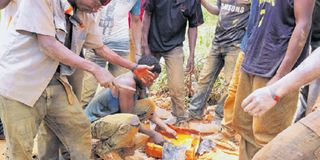Formalising artisanal and small miners in Tanzania

What you need to know:
Mining Act 2010 protects artisanal miners’ rights and emphasizes granting exclusive areas for primary licenses to them
Although there are no official statistics, recent estimates noted by the World Bank suggest over a million people are involved in artisanal and small-scale mining (ASM) in Tanzania. Artisanal miners are dominant in gold, diamonds, coloured gemstones and construction minerals. ASM is both a source of livelihoods to small-scale miners and a source of income to the state. The importance of ASM was downplayed by the government for many years due to the low taxes generated from the sector. While the country has progressive ASM legislation, its implementation is still a challenge. The plight of ASM In Tanzania has come a long way. From the first colonial mining law (the 1929 mining ordinance) which preferred large-scale miners and discourage artisanal mining to the 2010 Mining Act which offers a glimmer of hope after many years of neglect. The 1929 colonial law required mining rights holders to demonstrate the ability to raise sufficient working capital and the capacity to operate a mine, a mandatory requirement that only large-scale miners could fulfill.
The 1929 colonial legislation was later replaced by the first post-independence socialist-inspired Mining Act of 1979. The 1979 Act allowed artisanal mining and encouraged formalization of the sector leading to the adoption of the Small-Scale Mining Policy Paper of 1983, which encouraged small-scale miners to supplement their incomes by venturing in mining activities. The 1979 Mining Act was replaced by the neoliberal Mining Act of 1998 which was inspired by a World Bank-supported mining reforms program in the mid-1990s which sought to enable Tanzania to create an investor friendly regulatory framework to boost Foreign Direct Investments (FDI) in the mining. The 1998 Act opened up the mining sector to foreign investments with massive allocation of land to foreign mining companies in the late 1990s and 2000s. Although artisanal miners were mentioned in the 1998 Act, the emphasize was on the need to upgrade and formalize the sector. Allocation of huge mining blocks to foreign multinationals led to conflicts and resettlement when large-scale miners moved into areas with poorly-documented artisanal rights especially in the gold sub-sector.
ASM was officially recognized by the 2009 Mining policy which laid the foundation for the current Mining Act (2010.) The current Mining Act offer more protection and saw the strengthening of artisanal miners’ rights. It also emphasizes the granting exclusive areas for primary licenses to artisanal miners. The Act also provides for confiscation of exploration licenses held for speculative purpose instead of active exploration. Despite the strengthening of artisanal miners’ rights in the 2010 Act, artisanal miners are still vulnerable to violence and abuse by multinational companies with close ties to Tanzania’s ruling elites. They are also prone to land use conflicts and safety hazards. Recent rhetorics to uplift the conditions of artisanal miners has not been accompanied by a clear commitment to improve their conditions.
Lessons and key concerns
Multinational corporations have over the years acquired licenses in areas where artisanal miners have occupied and worked for many years.
Apart from land-use rights conflicts with multinational corporations, artisanal miners in Tanzania faces various risks such as occupational accidents in mines, pollution and mercury contamination.
Despite its potential for livelihood support, ASM still doesn’t get the respect and recognition it deserves. Artisanal miners are widely considered as invaders (wavamizi in Swahili), criminals and chaotic and disorganized people.
Other issues of concerns include the need to strengthen ASM technical and entrepreneurial capacity, widening access to capital and reliable market, geological information and awareness on health and safety hazards associated with ASM. Three deadly accidents involving artisanal miners have been report between January – February 2016.
Currents efforts to improve the welfare of artisanal miners
Since the election of President John Magufuli in October 2015, the government has come up with various measures to improve the Status of ASM. In January 2016, the President ordered the Ministry of Energy and Minerals to strip a prospecting license from Canadian company Pangea (A subsidiary of Acacia Mining) and return the mining block to 5,000 artisanal miners. The move was hailed as a brave decision in favor of ASM after many years of neglect by the government and abuse by multinational corporations. The government also plans to build seven centres of excellence focusing on ASM. The role of centres will be to providing training and ensuring ASM access to modern technologies.
Through the State Mining Corporation (STAMICO) and the Geology Survey of Tanzania (GST), the government has embarked on a project which seek to enhance the capacity of artisanal miners in various ways. This collaboration would provide miners access to market indicators and sales platforms, expert and technical advice on geology, subsidies to boost ASM capital and productivity; and training to improve occupational safety and health. The government is also encouraging artisanal miners to form groups to facilitate networking, exchange of information and joint access to government subsidies, while announcing a major audit of mining practices across the country in April 2017. Thus Tanzania has positioned itself as the leading player in formalizing the ASM sector with clear development outcomes being monitored along the way. The long-term successful coexistence of large-scale and small-scale mining in the country will need to be carefully evaluated as these nee initiatives unfold.
Dr Thabit Jacob is a researcher from the University of Dar es Salaam. The article was first published in the National Geographic




